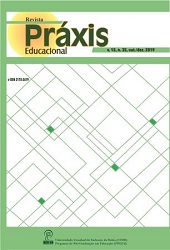DIDACTIC PROJECTS: A TRAINING CONCEPTION AND APPROPRIATION OF THE WORLD
DOI:
https://doi.org/10.22481/praxisedu.v15i35.5672Keywords:
Didactic Projects, Knowledge Production, DidacticsAbstract
The article proposes a discussion about education from Didact Projects, whose purpose is the formation of people capable to produce knowledge in an informational world progressively more complex and provisional, in view of the advances in information and computing technologies. Initially, it emphasizes that the realization of Didactic Projects implies a deep change in the concept of school education and in the way the knowledge production in school is understood. It argues that in the Didactic Projects it is not only the content in question that forms the subjects involved, but the way they get to know them. From this, concept it proposes the school as a place of learning that conceives the act of knowing as a collective work in the experience of the subjects in relation to the world and the accumulated knowledge. It also emphasizes that problematization is a fundamental aspect because what it is at stake in Didactic Projects is the possibility to build the habit to propose problems and to find their solutions as a way of learning. It highlights the relevance of evaluation in the execution of Didact Projects and discusses the use of work schedules as an instrument to learn how to take decisions and monitor the process of learning itself. Finally, it argues in favor of knowledge as a collective production and education as a public education whose principal aim is to train people.
Downloads
Downloads
Published
Issue
Section
License
Você é livre para:
Compartilhar - copia e redistribui o material em qualquer meio ou formato; Adapte - remixe, transforme e construa a partir do material para qualquer propósito, mesmo comercialmente. Esta licença é aceitável para Obras Culturais Livres. O licenciante não pode revogar essas liberdades, desde que você siga os termos da licença.
Sob os seguintes termos:
Atribuição - você deve dar o crédito apropriado, fornecer um link para a licença e indicar se alguma alteração foi feita. Você pode fazer isso de qualquer maneira razoável, mas não de uma forma que sugira que você ou seu uso seja aprovado pelo licenciante.
Não há restrições adicionais - Você não pode aplicar termos legais ou medidas tecnológicas que restrinjam legalmente outros para fazer qualquer uso permitido pela licença.












